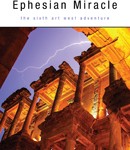In order to get clarity on Tom’s argument about various Pauline texts referring to ‘the return of YHWHW’ being associated with the incarnation of Jesus, I have asked Tom to state as clearly as possible which texts in Paul definitely refer to the second coming. His short list, sent to me via email includes the following–“clearly Phil 3.20f., 1 Thess 1.10 and 1 Thess. 4 of course, Col 3.4… and I assume that Jesus’ coming/appearing is the central feature of the ‘big picture’ passages such as Rom 8 and 1 Cor 15…”.
Fair enough. Tom is not collapsing all future references to the return of Christ into references to the first coming of Christ. And yet the discussion in pp. 700-710 leads precisely to that question where again and again Tom associates the incarnation of Jesus with ‘the return of YHWH’ texts (yom Yahweh texts). The problem is, Gal. 4 and other texts suggest that the first coming of Jesus was to redeem Israel out from under the Law, not to judge them for their sins. Notable, Paul has very little to say about the existing Herodian temple, which in itself is rather remarkable. What is even more remarkable is Paul’s use of Is. 59.20-21 in Rom. 11.26-27. Here Paul associates the second coming of Christ with the return of YHWH to Zion to finally turn away the impiety of Jacob, judge their sins and redeem them. Paul says this is when ‘all Israel will be saved’. The parallel of Jacob with Israel here surely rules out the notion that ‘Israel’ in vs. 25 could possibly refer to the church (or even to just Jewish Christians, rather than non-Christian Jews). No Paul’s entire argument is that the full number of Gentiles will first be saved, and then in the same manner, at the second coming ‘all Israel’ will be saved, by which is meant a large number of Jews (as the phrase ‘all Israel’ means both in various places in the OT and in the Mishnah. It is not a claim that every last Israelite will be saved).
Now if this is true, and it is also true that Paul associates the return of YHWH for judgment with Christ’s return to ‘put all his enemies under his feet’ (1 Cor. 15), then it seems to muddy and muddle the waters to suggest that the return of YHWH, (Yom Yahweh) should be associated with Christ’s first coming. If Paul did this as well, then he himself would seem to have created a muddle.
Pp. 705-06 clarify things a bit. Tom is suggesting that in the ‘Messiah’s people (i.e. Jew and Gentile united in Christ) the end has already been inaugurated already. In that context, every knee already bows and already confesses Jesus is Lord. Tom clarifies by putting the matter this way: “That which Zechariah envisioned [Zech. 14.5-9]as the final reality, and that to which Paul himself still looked forward in 1 Thess. 3.13, and in great passages such as 1 Cor. 15.20-28, had already been inaugurated through the Messiah’s death and resurrection.” (p. 706).
It is easy enough for Tom to make clear that when Paul uses Kyrios of Christ he applying one OT name for YHWH to Jesus (in this case ‘adon’ mainly). But he goes on to demonstrate that theos is also used from time to time of Jesus, particularly in Rom. 9.5 (p. 707). It is not difficult to show, as Wright does that the argument that Christ is absent in Rom. 9-11 after Rom. 9.5 simply is wrong, and a rather desperate move to try and deny Paul saw Christ as in some sense God. I have no objection to the basic argument on pp. 708-09. but one point is worth taking up. Tom says that the new covenant is a ‘renewal’ of the covenant with Abraham with the promises given to Abraham. This is not in fact how Paul views the matter— it is a matter of the fulfillment of the Abrahamic covenant in the new covenant, and in the process the by passing of the temporary covenant— the Mosaic covenant. Covenant renewal is one thing. Covenant fulfillment is quite another. The Mosaic covenant is fulfilled and brought to an end/completion/goal in Christ (Rom. 10.4). This does not mean it has been renewed in the new covenant. Nevertheless, Tom is quite right that Paul takes for granted the high Christology which can even call Christ theos. He does not argue for it, he simply asserts it and assumes his audience will agree. This does indeed suggest that high Christology, even divine Christology existed in the minds and hearts of the earliest Christians even in the 40s, and indeed already in the Jerusalem community (hence the origin of the marana tha prayer or cry).
What of Paul’s view of the Holy Spirit? We will turn to this in the next post.














